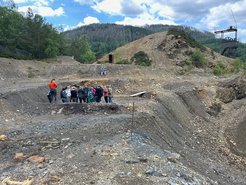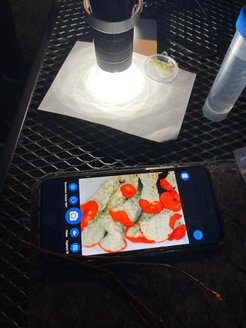Mining Metabolisms. Commoning place-based planetary practices for the Anthropocene
PhD project by Carlina Rossée (since April 2024)

This PhD project is rooted in transdisciplinary collective practices, while departing from mining sites in Germany, the Harz region, the Ore Mountains, and the lignite mining districts of Lusatia. Taking up the concept of metabolism from biology and political ecology, her research traces novel ecologies via the flows of energies and epistemologies, materialities, infrastructures, cultural memories, toxicities, affects and aesthetics that are emerging, and from out of which she is working to develop new, sensible modes of inquiry.
Engaging in regional ethnographies, her dissertation sheds light on how certain mineral reposits, like silver, copper, lignite, and uranium have unfolded into specific technologies, economies, as well as social constructions, collective identities and cultures. Each of these pathways leads into a specific method and a transdisciplinary set of approaches, that combine (geo-)anthropology, critical geography, political ecology, the Earth and life sciences, environmental humanities, history of science, activism and artistic research, amongst others. While laying out the specificities of the cosmological and technological shifts that surround these materialities, a set of ‘vertical’, situated investigations will open up a transhistorical ‘horizontal’ network of relations across minescapes. The aim is to broaden perspectives on the socio-ecological burdens that industrial minescapes carry within and beyond past and future transitions, while exploring, from an ecofeminist angle, practices of repair and regeneration.

Since 2022, Carlina has facilitated and now chairs the transition of the project into the Anthropocene Commons, a self-organised, open community of researchers, educators, activists, artists and scientists who are collectively imagining and exploring practices for transformative pedagogies and collective action.
It is the collective practice pursued with the Anthropocene Commons , a worldwide community of researchers, educators, activists, artists and scientists that emerged from the Anthropocene Curriculum , a platform on transformative knowledge practices in the Anthropocene (initiated by Haus der Kulturen der Welt and Max Planck Institute for the History of Science, Berlin).
It this transdisciplinary network that is methodologically reflected and expanded upon in this PhD project, while focusing on local landscapes of extraction. Activating the Anthropocene as a ground for commoning place-based planetary practices, the dissertation aims to develop transdisciplinary methods for co-learning with and within the transforming planet’s flows and relations, thereby contributing to the development novel approaches to Anthropocene research and geo-anthropology.












